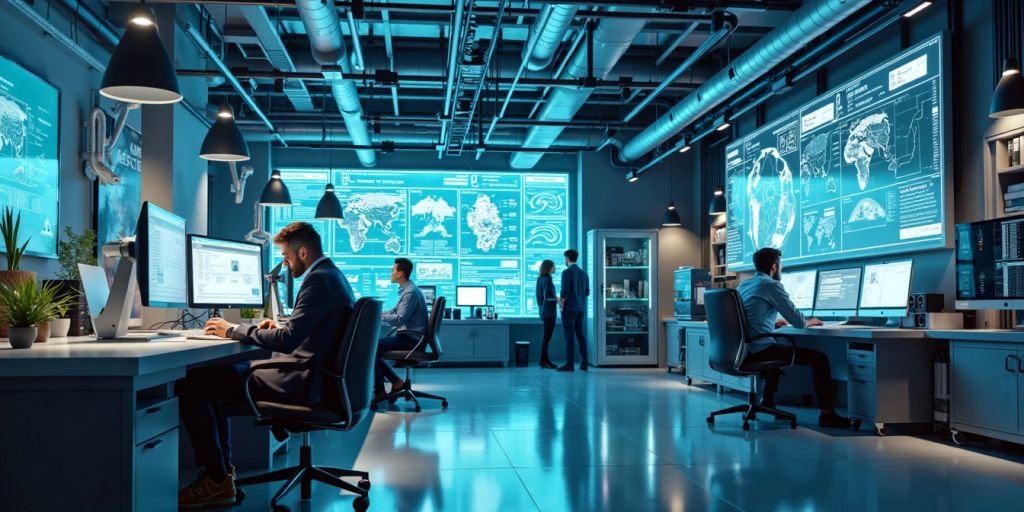Hard tech startups are changing the way we think about technology and its impact on our world. These companies are not just about creating new gadgets; they focus on solving big problems and making industries better. From green energy to advanced materials, hard tech startups are paving the way for a brighter future. This article explores their role, the challenges they face, and the exciting innovations that are shaping tomorrow’s industries.
Key Takeaways
- Hard tech startups are crucial for developing new technologies that can solve major global issues.
- They are transforming traditional industries by introducing innovative solutions and practices.
- Funding and regulatory challenges are significant hurdles for these startups.
- Collaboration between startups, research institutions, and governments boosts innovation.
- The future looks bright with emerging technologies and sustainable practices driving growth.
The Role of Hard Tech Startups in Driving Technological Innovation

Hard tech startups are at the forefront of transforming industries through innovative solutions. They focus on developing complex technologies that often require significant research and development. Here’s how they are making a difference:
Pioneering New Technologies
- Creating groundbreaking products that change how we live and work.
- Investing in advanced materials and manufacturing processes.
- Pushing the boundaries of robotics and automation.
Transforming Traditional Industries
- Revamping sectors like healthcare with new medical devices.
- Enhancing energy efficiency in manufacturing.
- Introducing smart technologies in agriculture to boost productivity.
Creating Sustainable Solutions
- Developing renewable energy technologies to combat climate change.
- Focusing on waste reduction and recycling innovations.
- Implementing sustainable practices in production and supply chains.
Hard tech startups are not just about profit; they aim to create a better future through sustainable innovation.
These startups are essential in driving technological progress and addressing global challenges. Their commitment to innovation is shaping the future of various industries, making them a vital part of the tech ecosystem.
Key Challenges Faced by Hard Tech Startups

Hard tech startups are at the forefront of innovation, but they face several significant challenges that can hinder their growth and success. Navigating these obstacles is crucial for their survival and impact.
Funding and Investment Hurdles
Securing funding is often one of the biggest challenges for hard tech startups. Unlike software companies, hard tech ventures typically require substantial capital for research, development, and manufacturing. Here are some common funding hurdles:
- High initial costs: Developing hardware often involves expensive materials and equipment.
- Longer time to market: Investors may hesitate due to the extended timelines before seeing returns.
- Limited investor interest: Many investors prefer software startups due to quicker returns.
Navigating Regulatory Landscapes
Hard tech startups must comply with various regulations that can be complex and time-consuming. Key regulatory challenges include:
- Safety standards: Products must meet strict safety regulations, which can delay development.
- Environmental regulations: Compliance with environmental laws can add to costs and complexity.
- Intellectual property: Protecting innovations can be challenging and costly.
Scaling Operations Effectively
Once a hard tech startup has a viable product, scaling operations presents its own set of challenges:
- Manufacturing capabilities: Scaling production requires significant investment in facilities and equipment.
- Supply chain management: Establishing a reliable supply chain is crucial for consistent product delivery.
- Talent acquisition: Finding skilled workers in specialized fields can be difficult.
The journey of a hard tech startup is filled with hurdles, but overcoming these challenges can lead to groundbreaking innovations that change industries.
By understanding and addressing these challenges, hard tech startups can better position themselves for success in a competitive landscape.
Success Stories of Hard Tech Startups
From Idea to Market Leader
Every successful startup begins with a simple idea. Hard tech startups have shown that innovation can come from anywhere, whether it’s a university lab or a casual coffee chat. Here are some notable examples:
- Facebook: Started as a social network for college students, now a global platform.
- Airbnb: Revolutionized the hospitality industry by allowing people to rent out their homes.
- Uber: Changed the way we think about transportation with ride-sharing.
Innovative Products and Solutions
Hard tech startups are not just about ideas; they create products that change lives. Some innovative solutions include:
- 3D Printing: Companies like Formlabs are making it easier to create custom products.
- Renewable Energy: Startups like Tesla are leading the charge in sustainable energy solutions.
- Biotechnology: Firms like Ginkgo Bioworks are using biology to solve complex problems.
Impact on Global Markets
The influence of hard tech startups extends beyond their products. They are reshaping entire industries and economies. Here’s how:
- Job Creation: These startups are creating thousands of jobs worldwide.
- Economic Growth: They contribute significantly to GDP in many countries.
- Global Reach: Many hard tech startups are expanding their markets internationally, impacting economies around the globe.
The journey of hard tech startups is a testament to the power of innovation and creativity. Their success stories inspire future entrepreneurs to dream big and act boldly.
The Future of Hard Tech: Trends and Predictions
Emerging Technologies to Watch
The future of hard tech is bright, with several emerging technologies set to change the game. Here are some key areas to keep an eye on:
- Renewable Energy: Innovations in solar, wind, and other renewable sources are crucial for a sustainable future.
- Electric Vehicles: The shift towards electric cars is not just a trend; it’s a movement towards cleaner transportation.
- Advanced Manufacturing: Techniques like 3D printing are revolutionizing how products are made, making them faster and cheaper.
The Role of Artificial Intelligence
Artificial Intelligence (AI) is becoming a major player in hard tech. It helps companies:
- Analyze Data: AI can sift through large amounts of data to find patterns that humans might miss.
- Automate Processes: This leads to increased efficiency and lower costs.
- Enhance Products: AI can improve product features, making them smarter and more user-friendly.
Sustainable and Green Innovations
Sustainability is at the forefront of hard tech innovations. Companies are focusing on:
- Eco-friendly Materials: Using materials that are less harmful to the environment.
- Energy Efficiency: Creating products that consume less energy.
- Waste Reduction: Developing processes that minimize waste during production.
The future of hard tech is not just about new gadgets; it’s about creating a better world through innovation. Work smart, not hard is the mantra for tech entrepreneurs aiming to elevate success in this evolving landscape.
Collaborative Efforts in the Hard Tech Ecosystem
In the world of hard tech, collaboration is key to driving innovation and success. Startups often rely on partnerships to enhance their capabilities and reach. Here are some important aspects of collaboration in this ecosystem:
Partnerships with Research Institutions
- Collaborating with universities and research centers helps startups access cutting-edge research.
- These partnerships can lead to joint projects that push the boundaries of technology.
- Startups can benefit from the expertise of seasoned researchers and scientists.
Industry-Academia Collaborations
- Working with academic institutions allows startups to tap into fresh ideas and talent.
- These collaborations can result in internships and job placements for students, fostering a new generation of innovators.
- They also provide startups with a platform to test and validate their technologies.
Global Innovation Networks
- Startups can join global networks to share knowledge and resources.
- These networks facilitate connections with other innovators, investors, and mentors.
- By participating in these networks, startups can gain insights into market trends and customer needs.
Collaborative innovation requires more than just an initial connection. It needs a nurturing environment where ideas can be freely exchanged and critiqued.
In summary, collaboration in the hard tech ecosystem is essential for fostering innovation and overcoming challenges. By working together, startups can leverage shared resources and knowledge to create impactful solutions.
The Importance of Research and Development in Hard Tech
In the world of hard tech, research and development (R&D) is crucial for success. It helps companies create new products and improve existing ones. Here’s why R&D is so important:
Driving Innovation Through R&D
- R&D is the backbone of innovation. It allows companies to:
- Explore new ideas and technologies.
- Develop unique products that stand out in the market.
- Solve problems that others haven’t tackled yet.
Investment in Cutting-Edge Technologies
- Companies that invest in R&D can:
- Stay ahead of competitors.
- Adapt to changing market needs.
- Create solutions that meet future demands.
Overcoming R&D Challenges
- While R&D is essential, it comes with challenges:
- High costs can be a barrier, especially for smaller startups.
- Not every project will succeed, leading to potential losses.
- Companies need to find ways to manage these risks effectively.
R&D is not just about creating new products; it’s about ensuring long-term growth and sustainability in a rapidly changing world.
By focusing on R&D, hard tech startups can drive innovation and make a significant impact on their industries and society as a whole.
Navigating the Funding Landscape for Hard Tech Startups
Funding is a crucial part of launching and growing hard tech startups. Capital may be less abundant than in years past, but understanding the funding landscape can help founders secure the necessary resources to thrive.
Seed Funding and Early-Stage Investment
- Seed funding is often the first step for startups, providing the initial capital needed to develop ideas.
- This funding helps validate concepts and attract talent.
- Founders should focus on building a strong business model to attract investors.
Venture Capital and Growth Funding
- Venture capitalists (VCs) play a significant role in scaling operations.
- Startups should seek VCs who align with their vision and values.
- Building relationships with VCs can lead to future funding opportunities.
Government Grants and Incentives
- Many governments offer grants and incentives to support innovation in hard tech.
- These funds can help startups reduce financial risks.
- Researching available programs can provide additional funding sources.
Navigating the funding landscape requires persistence and strategic planning. By focusing on building a strong business and aligning with the right investors, startups can secure the funding they need to innovate and grow.
The Impact of Hard Tech Startups on Society and the Economy
Hard tech startups are making a significant difference in our world today. They are not just about creating new gadgets; they are reshaping entire industries and improving lives. These startups are crucial for economic growth and job creation.
Job Creation and Economic Growth
- Hard tech startups often lead to the creation of new jobs in various sectors.
- They contribute to local economies by attracting investments and talent.
- Many of these companies are focused on solving real-world problems, which can lead to sustainable economic development.
Enhancing Quality of Life
- Innovations from hard tech startups can improve healthcare, transportation, and energy efficiency.
- They often focus on making everyday tasks easier and more efficient for people.
- By developing new technologies, they help address issues like pollution and resource scarcity.
Addressing Global Challenges
- Hard tech startups are at the forefront of tackling major global issues such as climate change and food security.
- They create solutions that can be scaled to have a worldwide impact.
- Many of these companies are committed to sustainability, ensuring that their innovations benefit both people and the planet.
In a world where challenges seem overwhelming, hard tech startups are shining examples of how innovation can lead to positive change. They remind us that with creativity and determination, we can build a better future for everyone.
| Impact Area | Description |
|---|---|
| Job Creation | New jobs in tech and related fields |
| Economic Growth | Boosting local and national economies |
| Quality of Life | Improving daily living through innovative solutions |
| Global Challenges | Addressing issues like climate change |
Conclusion
In summary, hard tech startups are not just changing the game; they are paving the way for a brighter future. These companies are using new ideas and technologies to tackle big problems that affect our lives and the planet. As we look ahead, it’s clear that innovation is key to making the world a better place. By focusing on smart solutions and working together, these startups can create jobs, improve our daily lives, and help protect the environment. It’s important for everyone, especially young entrepreneurs, to stay curious and keep learning. The future is full of possibilities, and with the right mindset, anyone can be part of this exciting journey.
Frequently Asked Questions
What are hard tech startups?
Hard tech startups focus on creating new technologies that require significant engineering and scientific research. They often work on physical products or complex systems.
How do hard tech startups impact traditional industries?
These startups can change traditional industries by introducing new technologies that improve efficiency, reduce costs, and create better products.
What challenges do hard tech startups face?
They often struggle with funding, regulatory issues, and the difficulty of scaling their operations.
Can you give examples of successful hard tech startups?
Sure! Companies like SpaceX and Tesla started as hard tech startups and have become leaders in their fields.
What trends are shaping the future of hard tech?
Emerging technologies like AI, renewable energy, and sustainable practices are key trends to watch.
How can someone get involved with hard tech startups?
You can join by studying relevant fields, networking with professionals, or even starting your own project.



